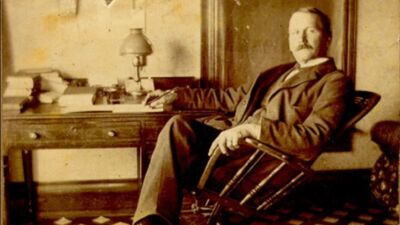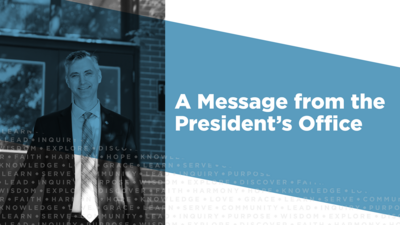Rev. George Weller's Address at the Dedication of Becker Hall

“In the year 1894, at about this time of the year, a goodly number of patrons and friends of this school were present here to witness and to take part in the dedication of what we now call the old building, the building north of this. Today, after thirteen years, we are here to dedicate a much larger and a much more commodious and entirely modern building. The two buildings, together with what other buildings have been erected in the course of thirteen years, tell the history of this school. It has been a period of continuous growth. The number of scholars attending this school has increased tenfold, and instead of one teacher we now have a staff, of six teachers and one assistant. Now, if this school were what it is sometimes called, the German College, if the sole or even the principal purpose of this school were to teach the descendants of German parents their mother tongue, the language spoken by about seventy-five million people in every part than the globe, spoken by a nation of which there is none more enlightened, more scholarly nor more progressive, I say, that if this were the purpose of this school, the time would never have come when the old building would not have afforded ample room to accommodate what number of scholars we could reasonably have looked for. But the act is that this school is a Normal School, carrying all the branches of study commonly taught in Normal schools with a few studies added to meet special demands, and the principal purpose of this school is the education and training of teachers for the parochial schools of our Lutheran church. This school is here, because our church, needed it, and it has grown, because the demand for such teachers is so great, that our first Normal School, located at Addison, Ill., could not supply the required number of teachers, and I may add that in spite of all that these two schools could accomplish the demand for teachers still exceeds the supply. Now why is it that in this land of ours, dotted as it is with schools free to all children, we go to the expense of building and maintaining our own schools? You may as well ask, why we Lutherans build our own churches, or why Methodists build churches for themselves, etc. They consider themselves in duty bound to do it. And that is just the reason why we have our own schools. We consider it a sacred duty that we owe to our children. In the first place we hold that parents are responsible for the education of their children. This is one of the great principles so ably advocated by Luther, the greatest educator of his time, the man, who laid the foundations upon which later generations of his countrymen have built that marvelous structure, true to the design of its architect, the common school system of Germany, second to none in the world. The common school, the school of the people and for the people, is the child of Protestantism, and its cradle is the Reformation. Like Luther we look to the home as the place where the child is to receive the better part of its education and training It is the place to which God points when he enjoins parents to bring up their children in the nurture and admonition of the Lord. The very best school is a poor excuse, a miserable substitute for a Christian home. It is preposterous to expect the school to remedy and to obviate the shortcomings and the mistakes of the home. I even venture to say that a school, attended by many scholars, coming; from all kinds of homes or no homes at all, is a dangerous place to which to send a child. No, we parents cannot shift on the school one particle of the responsibility that God has placed upon us. Nobody can release us of this our sacred duty.
Again, we hold that to educate a child means vastly more than merely to educate and develop the intellect, and to put into the child's head a certain amount of knowledge in the three R 's and like studies. The child has other faculties besides the intellect. It has a heart, it has a will, it has a conscience, it has an immortal soul, and they all need attention and fostering care. The head will never do the work of the heart or the conscience.
Now what means have we and do we employ in this, as we think, most important part of education? We have the word of God, given by inspiration, and profitable for doctrine, for reproof, for correction, for instruction in righteousness, that the man of God may be perfect, thoroughly furnished unto all good works, 2 Tim. 3-16. The child is first taught to render unto God the things that are God's, reverence, obedience, and implicit faith, and then to render unto Caesar and its fellowman the things that are theirs. The ten commandments are the basis of this instruction. But we do not stop here. We start from Sinai in order to reach Golgotha, and having arrived there at the foot of the cross on which Christ bled and died, we point to him, telling the child, "Behold the Lamb of God which taketh away the sin of the world. He was wounded for our transgressions, he was bruised for iniquities. Whosoever believeth in him shall not' perish but 'have everlasting life." This instruction begun as it should be in the home, while the child is on its mother's lap, is continued and amplified in our schools, until the child has become conversant not only with the leading facts narrated in the Bible, but also with its chief doctrines, the grandest of which is this, that sinful man is saved through grace by faith in Christ Jesus.
Now let me ask, Can this be done in the public schools? We thank God that no attempt is made to do it. We think all the more of our public schools because no attempt is made to turn them into public churches. We are unalterably opposed to any mincing of matters political and matters religious. The state has its province. God has put the sword into hands of the State, bidding the state to use it for the punishment of evil-doers and the protection of them that do well; but the Bible he has placed into the hands of parents and the church, bidding them to teach all nations whatsoever he has commanded, beginning with those nearest and dearest to them, their children.
It is true that for the sake of self-preservation and for other reasons the state must not neglect to teach and to inculcate in is school morality, obedience to law and constituted authority, respect for the rights of others and other virtues that tend to make the scholar a law-abiding and model citizen. But to christianize the scholars and to provide for their spiritual welfare is not the legitimate province of the state. We say, "Hands off, State, hands off." But what about Sunday schools? If Sunday-schools are good, Monday schools, and Tuesday schools and Wednesday schools, and Thursday schools, and Friday schools, besides Sunday schools, are so much the better. What if arithmetic were taught on only one day of the week and for a period of only thirty or forty minutes? How proficient could the student become in this study? It is just so with religion. And then it is not only the instruction that is imparted, but also the spirit of the school, the spirit that pervades all the work of the school, the atmosphere, as it were, in which the child lives and moves during school hours that should exercise a powerful influence on the character of the child.
I have now briefly stated the purpose of this school and why it is that this school is needed. What I said was not meant as an apology. I see no reason why we should apologize when we do our duty as God has given us to see it.
May it please God to further prosper our schools, and to let them continue to be in the future what they have been in the past, a blessing to our church and to our country, in which we enjoy that precious boon, religious liberty, the right to serve God according to the dictates of our conscience.”
Related Stories


